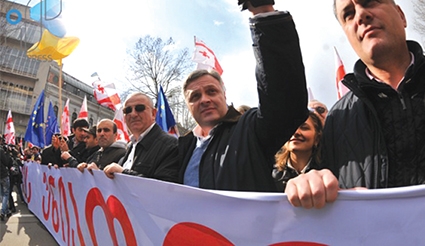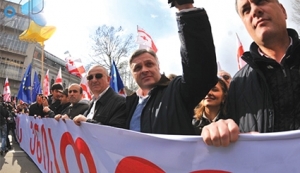2016 Parliamentary Elections – The Great Political Shootout for Power
OPED
Georgian President Giorgi Margvelashvili announced Tuesday at a special briefing that the 2016 parliamentary elections will be held on October 8.
The main political competition in the last four years is believed to be one of the critical moments in the Georgian democratic life.
As the country partially enters into a pre-electoral campaign, several players seem to be aspiring to gain the favor of the traditionally wavering Georgian electorate. In fact, the recent polls by several reputable local and international organizations clearly reveal that the popularity of ruling coalition Georgian Dream (GD) is plummeting. One of the motives for that failing belief in GD by Georgian citizens is the government’s economic failure and weak foreign policy.
At the same time, Georgia is strongly considered to still be under the unofficial leadership of the Georgian tycoon, Bidzina Ivanishvili, who moved to the backstage in 2013, after a one-year term as Prime Minister.
Observing GD’s visibly impalpable success on the Georgian political scene, it is hardly unexpected that the Coalition has been facing an internal dissolution in recent days.
The Republicans, a key faction in the Georgian Dream coalition, announced Thursday that they plan to officially withdraw from the embattled incumbent party prior to the elections.
Party Chairwoman Khatuna Samnidze announced the decision following a lengthy debate within the Republican leadership over the future path of the party. They are planning to play an independent game in the October race.
Notably, the ruling coalition’s unity started its obvious fluctuation from November 2014, when one of its key western-facing allies, Free Democrats (FD), notoriously departed from the ruling team. They accused the government of betraying Georgia’s European and Euro-Atlantic path by flirting with Russia.
Both the Republicans and Free Democrats are strongly believed to have played their nontrivial role in the Georgian Dream government, who were otherwise labelled as Russia-affiliates. The two parties controlled some key governmental positions including Defense, EU-NATO integration, Parliament and more, to secure Georgia’s Western path.
Currently, having arrived at a crossroads, even though the Republicans and the FD have been sympathized with for their Western orientation, they lack the needed public support that would enable them to gain a significant number of seats in the next parliament. Their strategic adversary in the elections is the country’s main opposition party, the United National Movement, who ruled Georgia for nine years following the Rose Revolution of 2003.
The UNM was expected to rebrand itself after the painful fiasco with GD in the 2012 elections, though the party remains on almost the same rails. Moreover, the UNM leadership, including ex-President Mikheil Saakashvili, currently serving as Odessa Governor in Ukraine, has only indirectly been involved in Georgian politics. Other UNM frontrunners, including ex-PM Vano Merabishvili, were imprisoned, which makes it hardly likely that the former government will regain a significant amount of power this term.
As for GD itself, although their policies and politics have been prone to wider public criticism, they are expected to seriously modify the existing team and advance some new faces in the party circle. This strategy is most likely designed to alleviate the negative public attitudes toward the government in order to get the second mandate.
In these convoluted circumstances, it would be least pragmatic to forget about openly Russian-leaning parties, such as Nino Burjanadze’s Democratic Party and The Patriots’ Alliance. Notwithstanding Russian sentiment plunging in the new generation, the two seemingly marginal parties have assembled their respective audience among the elderly, who are authentically anti-Western.
Last but not least, the newly established Pine Cone and the New Party of the Georgian philanthropist, Paata Burchuladze will be trying their best to be competitive in the election process.
Georgia’s political landscape is highly colorful and the forthcoming summer is prognosticated to be politically very hot. As the elections can significantly determine Georgia’s future democratic fate, there will be a massive unconventional shootout between the role players to succeed.
The elections are also expected to have a crucial role in terms of Georgia’s positive perception in Western communities and in solidifying the country’s state institutions for successful future governance. Relatively, Georgia’s EU and NATO aspiration can be in direct correlation to conducting democratic elections, which further underscores the utmost significance of this year for the territorially tiny country in the South Caucasus.
ZVIAD ADZINBAIA is an Analyst at Georgia Today, covering security, foreign policy, and the domestic politics of Georgia. He is affiliated with the Georgian Foundation for Strategic and International Studies (GFSIS).
Zviad Adzinbaia












